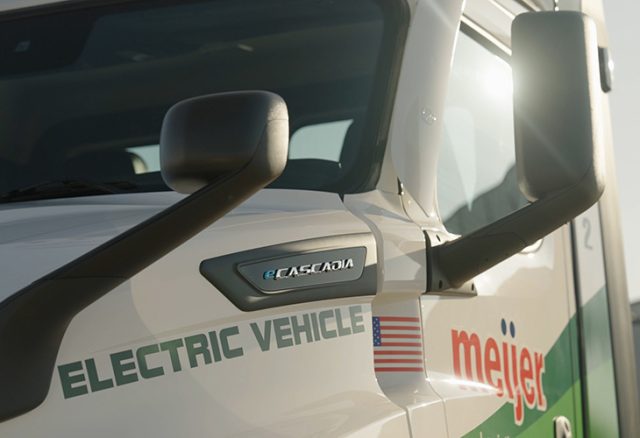GRAND RAPIDS, Mich. — Meijer, a retailer that operates one of the largest fleets in Michigan with 250 semitrucks and the first in North America to implement the Environmental Protection Agency’s 2010 near-zero emissions standards in 2009, is once again leading the retail industry by deploying two of the first all-electric semitrucks outside of California.
 The Grand Rapids, Mich.-based retailer is also the first nationwide to track the performance of the Freightliner eCascadia semitrucks in a cold weather environment as part of a grant from the U.S. Department of Energy.
The Grand Rapids, Mich.-based retailer is also the first nationwide to track the performance of the Freightliner eCascadia semitrucks in a cold weather environment as part of a grant from the U.S. Department of Energy.
“Our company’s earliest beginnings were marked by doing what’s right while keeping an eye toward innovation. That philosophy still guides us today and is exemplified by our company’s commitment to lessening our carbon footprint,” Meijer President & CEO Rick Keyes said. “We’re excited to continue our longstanding partnership with Freightliner to pave a sustainable future for the industry.”
Meijer received the battery electric semitrucks earlier this month and celebrated their inaugural delivery today with a more than 44,000-pound food donation to Gleaners Community Food Bank in Detroit alongside Gov. Gretchen Whitmer, and representatives from Meijer and Daimler Truck North America.
The two semis will operate out of the retailer’s Lansing Distribution Center, which is now equipped with specific charging infrastructure. They will make multiple deliveries daily to Meijer supercenters within a 200-mile trip range of the distribution center.
“With innovative companies, a storied manufacturing heritage, and the fastest growing clean energy sector in the country, Michigan is the best place to build the future,” said Governor Gretchen Whitmer. “As one of the first in the nation to deploy all electric semitrucks, Meijer is doing their part to preserve our pure Michigan natural resources while creating good-paying manufacturing jobs and setting a powerful example for companies everywhere. I look forward to building on our partnership with Meijer to grow Michigan’s economy and build a state where everyone can envision their future.”
Meijer became a test fleet for Freightliner in 2009 and was selected in 2019 to test the manufacturer’s battery electric semitrucks. After a successful conclusion of testing and integration of customer feedback in the design and development process, Freightliner is now rolling out the series produced battery electric truck to customers, including Meijer that received the first delivery. The retailer’s trucks were partially funded by a grant to DTNA from the U.S. Department of Energy’s Vehicle Technologies Office geared toward the demonstration of battery electric commercial trucks under diverse climate conditions. Meijer will continue reviewing data daily for temperature impact on mileage, charge times, battery life optimization and driver comfort.
“Through this partnership, we can help accelerate the industry’s transformation to electrification by applying valuable insights from data collected and real-world applications in a cold climate environment and make a meaningful difference when it comes to reducing greenhouse gas emissions,” said Mike Graham, Senior Vice President of Supply Chain and Manufacturing for Meijer. “We’re pleased to work with Freightliner to further put the eCascadia tractors into real-world applications outside of southern California as we look for solutions to achieve zero emissions.”
Freightliner’s new battery electric eCascadia truck is the zero-emission version of the industry-leading Cascadia and is ideally suited for short-haul routes that allow for depot-based charging. Extensive development and rigorous testing through several prototypes and customer-tested trucks resulted in a powerful and efficient electric truck with multiple battery and drive axle options, providing a typical range of 230 miles, depending on vehicle configurations. With time being of the essence in this industry, a maximum battery capacity of almost 440 kWh can recharge 80 percent of the truck in approximately 90 minutes. To increase safety for traffic participants, especially in urban environments, the 82,000-pound (GCW) Class 8 truck comes standard with Detroit Assurance with Active Brake Assist 5 and debuts the Active Side Guard Assist (ASGA). The ASGA is an industry-first technology that engages at urban speeds of 12 mph or less to mitigate the truck from making a right turn when a moving cyclist or pedestrian is detected on the passenger side of the truck.
“We are excited about the delivery of the eCascadia to Meijer as part of such an important industry. Our goal is to provide our customers with the safest, most reliable, and durable battery electric trucks to ensure their needs are met even for the toughest use cases,” said David Carson, Senior Vice President of Sales and Marketing for DTNA. “This delivery represents a significant milestone in our customers’ and also in our own journey to a zero-emission future.”
Detroit, the industry-leading manufacturer of engines, axles and transmissions, is the power behind the eCascadia. While the eCascadia is built in Portland, Ore., the in-house developed Detroit ePowertrain is designed for a full integration with the eCascadia in DTNA’s Detroit manufacturing facility located in Detroit. Last year, the company announced plans for a $20 million investment in the Detroit manufacturing facility to serve as the North American source of Detroit ePowertrain components.
The inaugural delivery of food donated by Meijer included 44,136 pounds of nonperishable food, including peanut butter and canned vegetables, fruit and meat that Gleaners representatives said will be immensely helpful and immediately delivered to their clients this holiday season.
“We are proud to stand with Meijer in service to our community,” said Gerry Brisson, President and CEO of Gleaners. “We applaud Meijer’s efforts to improve our planet while providing thousands of pounds of nutritious food for households that are struggling right now.”




You must be logged in to post a comment Login